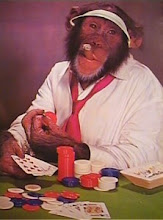Almost every time that I play no-limit I notice at least one person at the table who buys in with too little money. I often see women do this (no offense intended). More often than not, they end up losing that short stack and leaving the table within an hour or so.
The right amount to have in front of you when you sit down in a no-limit game is 100 times the big blind amount, or more, up to about 200 times the big blind. I usually would not buy in for much more than 200 times the big blind in an uncapped game, simply because bad beats and coolers inevitably occur and I don’t want to expose more than a small percentage of my poker bankroll to such risks. About 100-150 big blinds is the right amount to have in front of you if you want to be able to play your strongest poker against any opponent at the table and be able to maximize what you win, without having so much in front of you that you can be easily pushed off of a big pot because you simply can’t afford to lose an all-in.
The types of players who buy in short often proceed to play in a very timid and weak manner. Typically they are on “scared money,” that is, afraid to lose. In a 1-2 NLHE game, they often will buy in for the minimum of $60, or perhaps $100, when they should buy in for $200, or preferably $300. In a 2-5 game, they often will buy in for the minimum of $200, or perhaps $300, when they should buy in for $500. Buying in so short puts them at a very real and immediate disadvantage for several reasons, the biggest of which is that they cannot “play poker” against their opponents, i.e. play back at them with any substantial raise or re-raise. In other words, a player who has bought in short can be pushed around easily by opponents with bigger stacks – because any large bet to her puts her to a decision for a large part of her stack, if not all of it – yet at the same time she cannot push her opponents back with much force.
Also, buying in short practically guarantees that your fate as a winner or loser will be determined by a single hand. You might as well leave the poker room and put your $100 on red or black for one big roulette spin. If you win the hand, sure, you double up. But wouldn’t you rather play poker using your skill (however much or little you may have), rather than simply having to hope that your middle pocket pair holds up when somebody decides to call you all-in pre-flop with AK for your $90 because there is already $40 in the pot?
Obviously, most people who buy in short do so because they want to limit their potential losses. But if you expect to be a winner at the stakes that you have chosen to play, then you should naturally try to maximize that winning! In any form of poker, at any stakes, you cannot win if you are afraid to put your money into the pot (when doing so is the right move under the circumstances). Likewise, you should not be afraid to buy in with a full stack, so that you will be fully invested in the game and can take the fullest advantage of the inferior players at the table.
Of course, if you expect to lose in a certain game, you should not be playing in that game at all! You should move down to lower stakes, whether limit or no-limit, where you can continue to constantly learn and fill holes in your game, at much less cost and usually against much worse players than at higher levels. In fact, there are always lower stakes games on the Internet, i.e. 25-50 cents NL and even lower. Any poker player who wants to be a winner in the long term will be wise to wait until he is a fairly consistent winner at a certain level – and has accumulated a large enough poker bankroll to be able to take his game up another level without risking more than a small percentage of that bankroll – then naturally progress up the ladder of higher and higher stakes.
In any poker situation, you should always ask yourself what would a top-notch professional poker player do. You should do this not just during a particular situation that comes up in a difficult hand, but also regarding more “general” issues, including how much money to bring to the table and whether to leave when you are down, keep playing with a shortened stack, or re-buy to restore your stack. Other such general issues include choosing what stakes to play, game selection, table selection, when to quit playing for the day and when to take a break to avoid going on tilt. A top pro would almost always buy in for at least 100 big blinds in a no-limit game and would usually re-buy to the same level if his stack drops below 80 big blinds or so. That way – on top of all of the other reasons to buy in with a full stack – if the pro gets dealt pocket aces, and his opponent is willing to pay him off by going all-in with pocket queens or kings, the pro can win more money than he would win if he had a shorter stack – and isn’t winning the most money that you can win the object of the game?
Monday, December 1, 2008
Subscribe to:
Post Comments (Atom)


















10 comments:
some good advice
I agree totally.
Good blog too. I'll look forward to reading more here.
Good blog. I will visit here again. A bit too long though per post and a bit too long a wait between posts?
ZTT
I hate to do this, but...
You are totally 100% wrong when saying that someone buying in "short" is at a disadvantage.
The idea that they might as well go play roulette rather than risk it all on a single hand is so wrong it is scary.
Think about it...
In every game in the casino, the house has a mathematical advantage built in against the player. So that if you play 1 time at roulette, blackjack, or any other game your expected profit is negative.
Yet...
If you have a preset system of going allin in poker that maximizes strategy, you will have a mathematical advantage. On average you can get A 6 to kQ or pair of 88's to A10.
I won't take the time to explain proper short stack play, but the gist of this diary is all wrong.
sorry.
I understand that some people play that way. That is a strategy that Ed Miller teaches. I have seen famous pros like Barry Greenstein and Daniel Negreanu play as you suggest too. In fact, buying in short might fool some opponents into assuming that you play looser than you do, also. But what you are talking about was not the subject of my article at all!
My point was that IF and only IF you think that you have an edge in skill over your opponents, you want to maximaze the money in play, in order to take the fullest advantage of that edge. So for you to say that I am 100 percent wrong just reveals that you did not read my article at all. Obviously I was advocating a certain strategy, while others might advocate another.
It is like if I said in my article "Never date a girl with a rich dad." If I did that, it would be based on my personal experience, and the reasons behind my advice would make sense to people who are of a similar mindset to me, i.e. you'll never be happy because she'll spend every penny you earn and never appreciate you. But other guys might say "Always date girls with rich dads," because, in their lives, they have been able to get jobs or business leads through their girlfriends' rich dads. So it is all about perspective. Neither of us is "100 percent wrong." We just have different approaches to the game.
In the end, because the object of poker is to win money, whoever makes the most money in the long run is the better player, and therefore is using the better strategy. In my opinion, people should NOT buy in with a short stack IF they think they are better than their opponents at that table, because they would be sacrificing huge potential gain.
But thanks for your comment. It is appreciated. You are welcome here (not a donkey, probably). Feel free to post your real first name, by the way. I want to see more comments on this site. Only about 1/350 visitors posts a comment! Maybe if I post more often more commenters will post... I will try to get to that again soon... Life is in the way of it.
Freddie
I agree with Freddie. The anonymous idiot who posted on July 21 has no idea what he is talking about. The guy doesn't even explain what he means at all. That comment should've just been deleted. Note that he signs his name as "sorry." He is exactly that.
This is Anonymous from July 21, 2009 2:23 PM here... Ok. I see your point now... I misunderstood your post. Keep up the good writing... My real name is Leslie.
Couldn't agree more
I totally agree. I have much experience at this. One can study the probabilities, the tells and steel oneself to maintain patience and discipline but when you raise in middle position to $20 in a $1-$2 game after flopping a four flush and the button raises you your stack then concepts such as pot odds and equity don't always process themselves in ones mind the way you would wish. Also remember that with the blinds, the rake, the bad beat jackpot and the fact that your competing against 8 other stacks larger than yours plus cold cards that everyone will experience then taking all that into account it is indeed a bit of a roulette spin on any one particular hand.
I agree and I have the painful experience to back up what Freddie says.
When your in your local $1-$2 game and raise it $20 from middle position after flopping a four flush at a fairly loose table only to see the button reraise you your entire stack then concepts such as expected value versus pot odds don't always process in ones mind the way we would wish.
Also remember that with the blinds, the rake, the bad beat jackpot, the cold cards everyone experiences plus the fact your competing against 8 other stacks that may be larger than yours then taking that all into account it can be quite like a roulette spin for any one particular hand.
Post a Comment